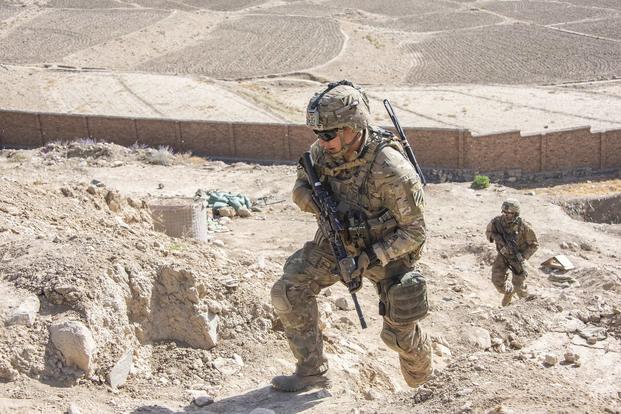The Security Force Assistance Brigade concept for specialized units to advise and assist local partner forces has proved its worth in Afghanistan, an SFAB commander said Wednesday. Now, the Army is preparing to go global with the experienced teams of non-commissioned and junior officers.
The 1st SFAB had success during nine months in Afghanistan. A second unit will deploy soon, followed by a third, Brig. Gen. Scott Jackson, commander of the 1st SFAB, said at a Pentagon briefing.
The Army is proceeding with the overall concept put forward months ago by Chief of Staff Gen. Mark Milley for SFABs to be available to combatant commanders worldwide to assist partner nations against insurgencies, Jackson said. Milley has since been nominated to become the next chairman of the Joint Chiefs of Staff.
The Army has five SFABs in the works and plans to assign one each to U.S. Central Command, Africa Command, European Command, Indo-Pacific Command and Southern Command, Milley said in January at an Association of the U.S. Army's Institute of Land Warfare breakfast.
Related content:
- Deadly Insider Attacks Bolstered Army Advising Unit's Resolve, General Says
- Soldier Killed in Insider Attack Was SFAB Command Sergeant Major
- Army IDs Infantryman Killed in Apparent Insider Attack in Afghanistan
- National Guard's New SFAB Will Be Spread Across Six States
Reports on the 1st SFAB's deployment to Afghanistan, which ended last November, were "extraordinarily positive," Milley said.
Their partnership with the Afghan forces against the Taliban was very successful, he said. "It's a tactical effect; it's not a strategic effect necessarily, but the tactical effect that they had was very positive."
In a separate interview Wednesday with The Associated Press, Jackson said future SFAB deployments around the world are likely to be in small teams rather than in brigade-sized units.
"I think future deployments throughout the world will be in much smaller packages," he told the AP. "I think a situation where you have a single team in a single country is a likely scenario."
At the Pentagon briefing, Jackson and other officers and NCOs from the 1st SFAB said their time on the ground in Afghanistan convinced them that the Afghan security forces could succeed against the Taliban.
"I totally disagree" with the notion that there is no end in sight for the Afghan war, now in its 18th year, Jackson said. But he gave no timeline for success in the U.S. strategy of pressuring the Taliban to a political settlement.
Command Sgt. Major Christopher Wren of the 1st SFAB said he saw improvements in the Afghans' ability to conduct offensive maneuvers.
"Just us being there gave them confidence," he said.
Separately, at a budget hearing Wednesday of the Senate Appropriations Committee, Joint Chiefs Chairman Gen. Joseph Dunford said the continuing mission in Afghanistan to forge a peace agreement with the Taliban is vital to U.S. homeland security.
About 20 terrorist groups that have made threats to attack the U.S. homeland are present in the region, he said, adding that it is his belief the U.S. presence in Afghanistan has "prevented another 9/11," although he acknowledged that it was difficult to prove.
Dunford said American troops should remain in Afghanistan "commensurate to the level of threat" posed to the U.S.
-- Richard Sisk can be reached at Richard.Sisk@Military.com.














